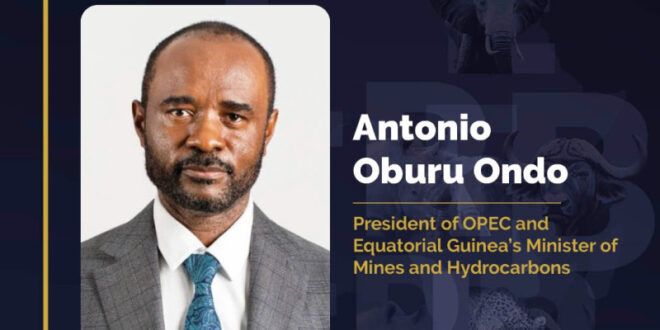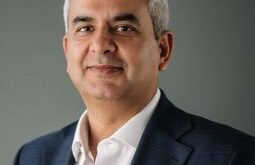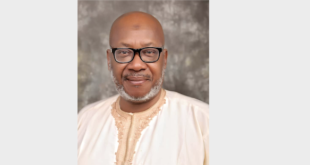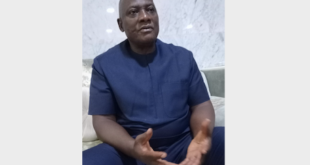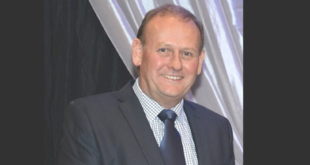In this exclusive interview with the African Energy Chamber, President of OPEC and Equatorial Guinea’s Minister of Mines and Hydrocarbons, Antonio Oburu Ondo, dives deep into the country’s exploration and drilling Strategies. Excerpts.
OPEC members recently met in Vienna for the 8th OPEC International Seminar. What measures is OPEC currently taking to stabilize the market given recent price increases?
The global oil market has experienced a relatively volatile few years but OPEC remains committed to contributing towards market stability, both for producers and consumers alike. We have been closely monitoring the market and the associated global dynamics, and our recent seminar in Vienna featured in-depth discussions about production, and maintaining a balance between supply and demand. OPEC will continue to monitor the market while cooperating with our member and non-member countries to address any market imbalances.
Equatorial Guinea’s Gas Mega Hub (GMH) initiative continues to make progress with a Heads of Agreement signed with Marathon Oil Corporation for the second and third phases of the project. What does the timeline look like for the project? Can we expect any milestones to be achieved in 2024 and 2025?
Phase one of the GMH comprised the tie-back of the Alen Field to the Punta Europa Liquefied Natural Gas (LNG) terminal on Bioko Island. This phase delivered first gas in February 2021, and soon thereafter, the government, alongside its project partners, have been working towards getting phase two onstream. In March this year we signed an agreement with Marathon Oil and Noble Energy for the next two phases of the project and we expect phase two to come online as early as January 2024. This stage involves processing gas from the Alba Field while phase three will facilitate gas processing from Noble Energy’s Aseng oil and gas field. Marathon Oil is also currently evaluating two infill drilling opportunities to improve the Alba production performance.
So, we will be starting 2024 with a major milestone and are aiming to reach many more after that. We have recently also established a bilateral trade agreement with Cameroon on cross-border oil and gas development while other exploration projects continue to make progress. A similar agreement was signed with Nigeria in 2022. These endeavors open up new opportunities for the expansion of the GMH by maximizing feedstock for the terminal.
With production decreasing due to natural declines in legacy fields, what efforts are being taken by the Ministry to boost output?
In addition to drilling works being undertaken to improve and maintain production levels at existing fields, the Ministry is making great strides towards accelerating exploration across the country’s offshore acreage. Our recent agreement with Cameroon will see the two countries jointly develop oil and gas projects along our maritime borders, including the Yoyo and Yolanda fields, the Etinde gas field and the Camen and Diega fields.
The country’s enabling environment for investment and strong record of successful offshore finds have also seen new E&P players join the market. Earlier this year we also signed three production sharing contracts with Panoro Energy and Africa Oil Corporation. These contracts are expected to further open up the upstream market. Additionally, we have several global energy majors and independents progressing with exploration and are optimistic about these campaigns. The only way to address production declines is to explore, drilling more wells and unlocking the potential of offshore basins.
Equatorial Guinea has recently inked agreements with regional neighbors Nigeria and Cameroon to expand energy cooperation. How is the government strengthening local content within the natural gas industry and how will these agreements help bolster capacity building on a regional scale?
Local content has and will always be a top priority for Equatorial Guinea. In our oil and gas sector, local content is enforced through the National Content Regulation and Hydrocarbons Law as well as additional ministerial decrees, individual production sharing contracts and local labor laws. Through clear regulation and regular engagement with both local and international energy companies, we continue to strengthen our local content and drive capacity building and opportunity.
In addition to policy, the government carries out skills and technology transfer through initiatives and training. We have a number of training and education institutions open and constantly engage our partners about exchange programs and bilateral skills development. Our agreements with neighboring countries fall under these efforts to up-skill and re-skill the workforce. We also believe that regional cooperation will help advance opportunities for oil and gas entrepreneurs. Our partnerships with other West African countries aim to increase trade, commerce and collaboration between Equatorial Guinea and its regional counterparts. These efforts are introducing opportunities for domestic and regional market growth as well as bilateral knowledge sharing.
African Energy Week 2023 takes place under a mandate to make energy poverty history by 2030. How does Equatorial Guinea plan to leverage its resources to achieve this objective and what messages will you be driving during this year’s conference?
Equatorial Guinea, like many other African countries, believes that in order to make energy poverty history, we need to monetize and maximize all of our natural resources. Our efforts to increase investment and bolster development across the entire energy value chain has already been instrumental in alleviating energy poverty. Equatorial Guinea has a wealth of natural gas resources and we are making progress to leverage these resources for domestic power generation. The Bioko Turbogas thermal power plant provides reliable power to the population and as the GMH expands, so will opportunities for gas-to-power.
The country is also capitalizing on its renewable energy wealth, and invites investors and project developers to invest in the country’s green energy sector. We are also working with other countries in Africa to expand trade and regional connectivity.
This year, I am looking forward to participating in a number of panel discussions, investor summits and ministerial forums, and will drive the message that gas is good for Africa. Equatorial Guinea has made significant progress to monetize both domestic and regional gas but a lot more needs to be done to maximize resources and drive industrialization and economic growth. Gas, as a clean and readily available resource, is the best way for Africa to achieve energy security while facilitating a just energy transition.
 ..:: AUTO REPORT AFRICA ::..
..:: AUTO REPORT AFRICA ::..
